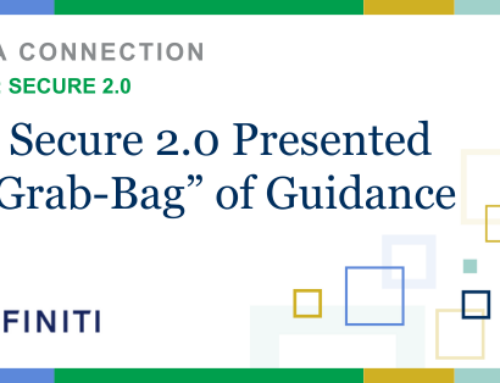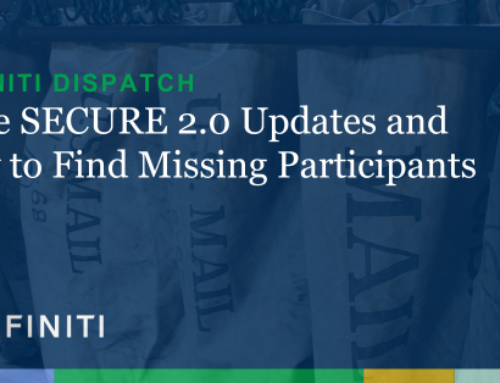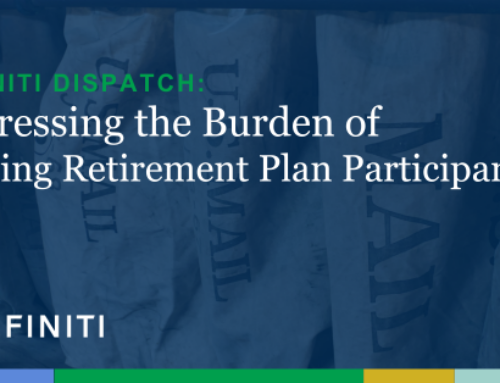Retirement plan sponsors already have a lot on their plates — especially if they juggle the responsibilities of managing the plan alongside their day job, such as being the company owner or human resources leader.
The plan sponsor’s inherent role as a fiduciary for the plan comes with hefty responsibilities that are time-consuming, time-sensitive and critical to the success of the plan, preserving its “qualified” status and performing all the legal and regulatory compliance obligations of a retirement plan. It can be tough to go it alone.
What is a Retirement Plan Fiduciary?
The Employee Retirement Income Security Act of 1974 (ERISA) set the standards of conduct for plan sponsors and those who manage employee benefit plans. Many of the actions involved in operating a retirement plan elevate the person or entity performing those actions to a fiduciary simply based on the functions being performed for the plan. Being a plan fiduciary is much more than a job title — it is a responsibility. A plan sponsor is a fiduciary, along with the individual trustees, plan committee members and plan investment advisors. It is a shared responsibility and everyone performing essential tasks follows the fiduciary standards of conduct set forth by the IRS.
According to the IRS, a fiduciary is defined as one who is:
- Acting solely in the interest of the participants and their beneficiaries
- Acting for the exclusive purpose of providing benefits to workers participating in the plan and their beneficiaries and defraying reasonable expenses of the plan
- Carrying out duties with the care, skill, prudence and diligence of a prudent person familiar with the matters
- Following the plan documents
- Diversifying plan investments
There are two types of retirement plan fiduciaries specifically tasked with investment-focused responsibilities, referred to as a 3(21) and 3(38) fiduciary. The Fiduciary Studio’s specialty, 3(16) fiduciary services, keeps retirement plans compliant and minimizes the risks associated with compliance activities while allowing plan sponsors to focus on the business of operating their business.
3(16) Administrator Minimizes Fiduciary Liability
The plan sponsor’s fiduciary responsibilities are coupled with the potential for personal liability, as a fiduciary is expected to serve in the best interest of the plan and its participants. A breach of fiduciary responsibility can leave a plan sponsor liable for avoidable errors and mistakes.
Fiduciaries who do not follow the basic standards of conduct may also be held personally liable for any financial losses to the plan and may have to repay any profits that would have been made through the plan’s assets because of their action — or inaction.
The good news is that plan sponsors can minimize their fiduciary risk by hiring a comprehensive 3(16) administrator to serve as a co-fiduciary to the plan. While some third-party administrators (TPAs) may already perform a few limited fiduciary duties, the best way to ensure all standards are being met is to engage a 3(16) administrator who can carry out all of the recommended duties.
Be wary of service providers that offer “delegated” services, say they act as agent on behalf of the plan sponsor, or aren’t willing to be named as 3(16) administrator within the plan document. Those service providers are not providing the protection and offload of liability afforded by a true 3(16) fiduciary.
Plan sponsors can minimize their fiduciary risk by hiring a comprehensive 3(16) administrator to serve as a co-fiduciary to the plan.
The Fiduciary Studio Difference
Many retirement services providers say they offer 3(16) fiduciary services, but this can mean different capabilities based on what the provider will actually deliver. The Fiduciary Studio’s 3(16) fiduciary services are comprehensive. Plan sponsors will never have to ask what 3(16) fiduciary services are not being performed. The Fiduciary Studio is able to assist with them all.
Despite what you might think, most errors made in retirement plan management have little or nothing to do with the investments or the investment manager. They involve daily plan administrative tasks. A comprehensive 3(16) administrator can monitor, review and execute many of these administrative tasks to ensure errors are avoided.
Some of the most frequent plan administrative mistakes include:
- An outdated plan document that does not adhere to recent legislative and regulatory updates
- Failure to follow plan terms and conditions
- Not filing a Form 5500 return at all or in a timely manner
- Not distributing a Summary Annual Report to participants
- Not sending required notices to participants
- Not notifying eligible employees of their opportunity to defer consistent with the timeline noted in the plan document
- Not satisfying nondiscrimination and coverage tests
- Not depositing employee elective deferrals on time
- Not making required minimum contributions for top-heavy plans
- Not conforming to the plan document and IRC Section 72(p) for participant loans
- Errors on hardship distributions
- Improper qualification and calculation of domestic relations orders
Plan sponsors can protect themselves against these types of errors by engaging a 3(16) fiduciary service provider that offers a comprehensive menu of services.
Plans That May Benefit From a 3(16) Fiduciary
Who benefits from hiring a 3(16) administrator?
Often, it is the plan sponsor who is experiencing any (or all) of these concerns:
- Has limited staff and needs help monitoring activities such as payroll, notices, eligibility and enrollment
- Is newer to the world of retirement plans and needs to bring in additional expertise
- Is concerned with the volume of compliance responsibilities and fiduciary risk/liability
- Experiences a high employee turnover rate
- An excessive amount of participant loans from the plan
- May have failed compliance testing in the past
- Submitted a corrective filing for a Department of Labor issue
3(16) Fiduciary Services FAQs
If you’d like to know more about The Fiduciary Studio’s 3(16) fiduciary services, expert staff is on call to answer your questions. In the meantime, here are the most common questions we receive about this offering.
Q: If a plan sponsor works with a 3(16) administrator, are they still considered a plan fiduciary?
A: Yes. Both the plan sponsor and 3(16) administrator are considered co-fiduciaries. By engaging a named 3(16) administrator, however, the plan sponsor mitigates the amount of risk and liability associated with the plan’s operational and administrative functions.
Q: When would a plan sponsor want to consider hiring a 3(16) fiduciary?
A: Any plan sponsor who would like to mitigate their risk and liability should consider hiring a 3(16) fiduciary. This becomes even more important for companies that do not employ a human resources specialist. There are also a few common operational flags that should warrant the retention of a 3(16) administrator, such as: 1) if the plan experiences a high employee turn-over rate, a 3(16) fiduciary could be invaluable determining eligibility dates; 2) difficulty in notifying the employer and newly eligible employees about their enrollment opportunities; and 3) any plan sponsor wanting to avoid many of the most common plan mistakes.
Q: Can a 3(16) fiduciary take all responsibilities away from the plan sponsor?
A: No, they cannot. Since a plan sponsor is also a fiduciary of the plan, they must maintain those responsibilities. Working with a comprehensive 3(16) fiduciary service provider, however, can reduce the risk and liability of violating plan provisions and requirements. A comprehensive 3(16) fiduciary will assist plan sponsors in avoiding many of the most common plan failings.
Q: Is there anything a 3(16) fiduciary isn’t allowed to do?
A: Generally speaking, a 3(16) fiduciary cannot provide investment management. That is where a 3(21) or 3(38) fiduciary should be engaged.
Q: What happens if a 3(16) fiduciary makes a mistake? Who is liable?
A: If the mistake is connected to one of the 3(16) fiduciary’s named responsibilities, they are liable. Should the 3(16), in its monitoring capacity, find an error from another service provider, the liability falls on that provider.
Q: Are plan participants aware that a plan sponsor chose to work with a 3(16) service provider?
A: Yes, the 3(16) provider should be named in the plan document as the 3(16) administrator, which is available to participants. That same information is often disclosed when 3(16) fiduciary’s services fees are passed on to the participants.
Q: Can you perform both the TPA and 3(16) administrator services for a retirement plan?
A: Yes, we do this now for many clients. Definiti delivers the TPA services for the plan, and The Fiduciary Studio fulfills the duties assigned as the 3(16) fiduciary.
We’re Here to Help
Ready to continue the conversation about 3(16) fiduciary services? Talk with your Definiti Regional Sales Director or Regional Sales Consultant about The Fiduciary Studio’s 3(16) services at (888) 912-3653 or sales@definiti-llc.com.
—

Melanie Williamson
Director, 3(16) Services
Melanie Williamson leads the 3(16) Fiduciary Services team at The Fiduciary Studio, a wholly owned subsidiary of Definiti. In addition, she manages a team or retirement plan consultants for Definiti which gives her greater visibility on the challenges plan sponsors face in administering their plans. She has been in the retirement industry since 1989.
The Fiduciary Studio team works closely with the administration and compliance teams on complex technical matters, voluntary correction program filings and escalated client relationship issues.
—
This material has been prepared for informational purposes only and is intended to provide general information on matters of interest in the area of qualified retirement plans and is distributed with the understanding that the publisher and distributor are not rendering legal, tax or other professional advice. Readers should not act or rely on any information in this article without first seeking the advice of an independent tax advisor such as an attorney or CPA.






